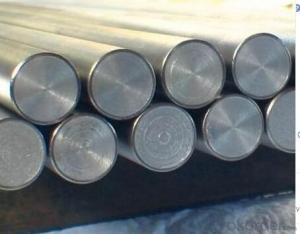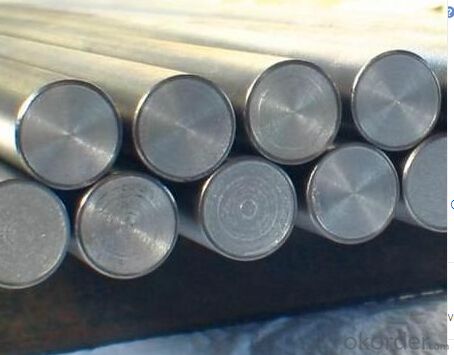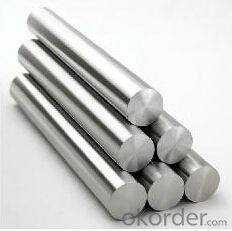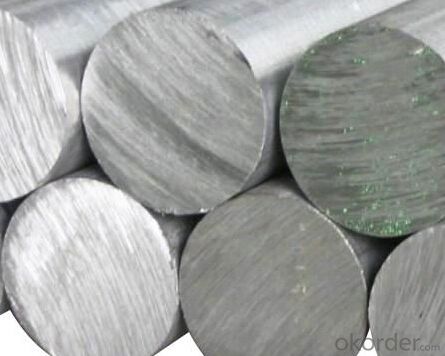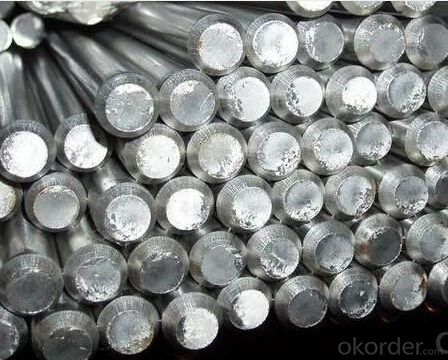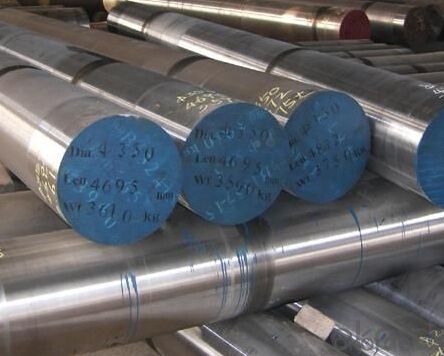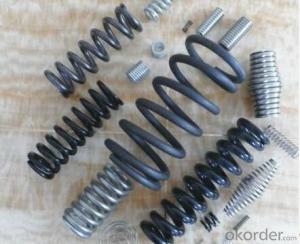ISO9001 Certificate Precision Compression Spring
- Loading Port:
- Tianjin
- Payment Terms:
- TT or LC
- Min Order Qty:
- 1000 m.t.
- Supply Capability:
- 50000 m.t./month
OKorder Service Pledge
OKorder Financial Service
You Might Also Like
Product Description:
OKorder is offering ISO9001 Certificate Precision Compression Spring at great prices with worldwide shipping. Our supplier is a world-class manufacturer of steel, with our products utilized the world over. OKorder annually supplies products to European, North American and Asian markets. We provide quotations within 24 hours of receiving an inquiry and guarantee competitive prices.
Product Applications:
ISO9001 Certificate Precision Compression Spring are ideal for structural applications and are widely used in the construction of buildings and bridges, and the manufacturing, petrochemical, and transportation industries.
Product Advantages:
OKorder's ISO9001 Certificate Precision Compression Spring are durable, strong, and resist corrosion.
Main Product Features:
· Premium quality
· Prompt delivery & seaworthy packing (30 days after receiving deposit)
· Corrosion resistance
· Can be recycled and reused
· Mill test certification
· Professional Service
· Competitive pricing
Product Specifications:
Specifications of ISO9001 Certificate Precision Compression Spring:
ISO9001 certificate
Wire diameter: 0.15mm to 7.0mm
Material: stainless steel, swc,swp
Engine valve spring
We have the CNC computer spring machine, non-cam and non-rocker, independent control by multiple servo motor, which can produce the biggest diameter spring. Fast production, precision positioning, steady operation. | |
Wire diameter: | 0.08mm-10mm. Size and style are made by drawings. |
Materials: | adopt the domestic and imported swc, sus, swp, mild steel wire, manganese steel wire, phosphorus copper wire, nickel-plated wire, zinc-plated wire, tin-plated copper wire, nickel-plated steel wire, non-magnetic stainless steel wire, heat-resistant steel wire, duplex stainless steel wire(corrosion resistant and heat resistant steel wire), bronze, copper, phosphorus copper, beryllium copper. Alloy steel has 60Si2MNA, 60Si2CRVA, 55CrSi. |
Surface treatment: | plate gold, silver, white, red yellow, blue, green, purple, black, etc., salt spray test more than 100 H. Appearance beautiful and bright. |
Application: | electronics, electrical appliances, toys, locks, stationery, furniture, washing machines, vacuum cleaners, lamps and lanterns, stroller, bicycle, gift, handicraft, gifts, cameras, printers, office equipment, precision equipment, all kinds of transportation, car accessories, sports equipment, switches, sockets, water heater, calculator, watches, ignition, mouse, motor, mobile phone, mementoes, fan, video DVD, etc |
Usage/Applications
We import the most sophisticated computer compression spring machine from Taiwan; it can do 100 percent inspection to spring length, which ensured the spring quality stable and precise
Widely used in automobiles, motorcycles, electrical appliances, telecommunication, communication, aviation, space and other civil fields
Packaging & Delivery
Inner packing: plastic or PE bags
Outer packing: corrugated cartons, wooden boxes or pallets
Testing equipment
We have a andvanced testing equipment to gueranteen the good quanlity of our products.
FAQ:
Q1: Why buy Materials & Equipment from OKorder.com?
A1: All products offered byOKorder.com are carefully selected from China's most reliable manufacturing enterprises. Through its ISO certifications, OKorder.com adheres to the highest standards and a commitment to supply chain safety and customer satisfaction.
Q2: How do we guarantee the quality of our products?
A2: We have established an advanced quality management system which conducts strict quality tests at every step, from raw materials to the final product. At the same time, we provide extensive follow-up service assurances as required.
Q3: How soon can we receive the product after purchase?
A3: Within three days of placing an order, we will begin production. The specific shipping date is dependent upon international and government factors, but is typically 7 to 10 workdays.
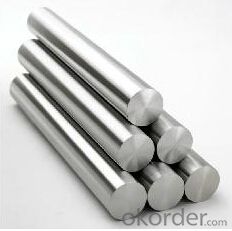
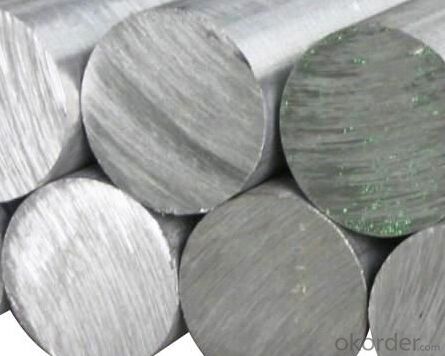
- Q: Can special steel be used in the energy sector?
- Yes, special steel can be used in the energy sector. Special steel refers to various types of high-performance alloys that are specifically designed for applications that require exceptional strength, durability, and resistance to corrosion and extreme temperatures. These properties make special steel an ideal choice for numerous components used in the energy sector. In the oil and gas industry, special steel is commonly used for the construction of pipelines, drilling equipment, and offshore platforms. Its high strength and corrosion resistance help in ensuring the integrity and reliability of these critical structures, even in harsh environments. Special steel is also widely utilized in power generation plants. For example, in thermal power plants, where steam is generated to produce electricity, special steel is used to manufacture boiler tubes and pressure vessels. The exceptional heat resistance and structural integrity of special steel ensure the safe and efficient operation of these components under high temperatures and pressure. Furthermore, special steel finds applications in renewable energy sectors such as wind and solar power. In wind turbines, for instance, special steel is used to manufacture rotor shafts, gears, and bearings, which are subjected to high mechanical loads. Similarly, in concentrated solar power plants, special steel is employed in the construction of the heat exchangers, receivers, and storage systems. Overall, the use of special steel in the energy sector is crucial for enhancing the overall performance, safety, and longevity of various components and structures. Its unique properties make it an indispensable material in supporting the energy industry's infrastructure and operations.
- Q: What are the properties of high-temperature tool steel?
- High-temperature tool steel possesses a combination of properties that make it suitable for use in high-temperature applications. It has excellent hardness, toughness, and wear resistance, enabling it to withstand extreme temperatures without losing its shape or strength. Additionally, it exhibits good thermal conductivity and dimensional stability, ensuring that it maintains its form and performance even under high heat and thermal cycling.
- Q: How is special steel used in the production of aircraft landing gear?
- Special steel is widely used in the production of aircraft landing gear due to its exceptional mechanical properties and durability. The landing gear is a critical component of an aircraft that supports its weight during takeoff, landing, and ground operations. It must withstand immense forces, impact loads, and harsh environmental conditions. Special steel, such as high-strength low-alloy (HSLA) steel or alloy steel, is specifically chosen for its superior strength-to-weight ratio, high fatigue resistance, and excellent corrosion resistance. These properties are vital for ensuring the landing gear's ability to withstand the extreme forces and stresses encountered during aircraft operations. The use of special steel in the production of landing gear provides several advantages. Firstly, it allows for a lighter weight landing gear, which contributes to the overall weight reduction of the aircraft, resulting in improved fuel efficiency and increased payload capacity. This is crucial for modern aircraft, as reducing weight is a key factor in enhancing performance and reducing operating costs. Secondly, special steel's high fatigue resistance ensures the landing gear can endure repeated loading cycles without any significant degradation in performance. This is critical as the landing gear experiences significant stress during each landing and takeoff, and it must be capable of withstanding these forces over a long operational lifespan. Furthermore, special steel's excellent corrosion resistance properties ensure the landing gear remains protected from environmental factors, such as moisture, salt, and other corrosive agents. Corrosion can weaken the structure of the landing gear, compromising its integrity and safety. Therefore, using special steel helps to ensure the landing gear's longevity and reliability, reducing maintenance requirements and costs. In summary, special steel plays a crucial role in the production of aircraft landing gear by providing exceptional strength, fatigue resistance, and corrosion resistance. Its use allows for lighter, more durable landing gear, resulting in improved aircraft performance, increased efficiency, and enhanced safety.
- Q: What are the different cryogenic grades of special steel?
- Specifically designed for use in extremely low temperature environments, there are several cryogenic grades of special steel available. These grades have been developed to retain their mechanical properties and prevent brittleness at cryogenic temperatures, making them ideal for applications such as LNG storage tanks, aerospace equipment, and low-temperature chemical processes. Among the commonly used cryogenic grades is the 300 series stainless steel, particularly types 304 and 316. These stainless steels contain nickel, which enhances their cryogenic toughness and ability to withstand thermal stress. Consequently, they are frequently employed in the construction of cryogenic storage vessels and piping systems. Another popular cryogenic grade is the 9% nickel steel, which is alloyed with approximately 9% nickel. This alloy provides excellent low-temperature toughness and ductility. As a result, it is often chosen for constructing LNG storage tanks, capable of withstanding the extremely cold temperatures required for the storage and transportation of liquefied natural gas. In addition, there are special low-temperature carbon steels, such as ASTM A350 LF2 and ASTM A333 Grade 6, which are engineered to maintain their toughness and impact resistance at cryogenic temperatures. These steels find extensive use in low-temperature applications, including cryogenic piping systems and equipment for the oil and gas industry. In conclusion, the various cryogenic grades of special steel encompass stainless steels (such as the 300 series stainless steel), 9% nickel steel, and low-temperature carbon steels (like ASTM A350 LF2 and ASTM A333 Grade 6). Each grade has been specifically designed to endure the challenges presented by extremely low temperatures while retaining their mechanical properties and resistance to brittleness.
- Q: How does special steel contribute to reducing product weight?
- Special steel contributes to reducing product weight through its unique properties. Special steel is known for its high strength-to-weight ratio, allowing manufacturers to use thinner and lighter steel components without compromising on strength and durability. This means that products made with special steel can be designed with reduced material thickness, resulting in overall weight reduction. Additionally, special steel's excellent corrosion resistance properties can eliminate the need for additional protective coatings, further reducing the product's weight.
- Q: Can special steel be used in the jewelry industry?
- Yes, special steel can be used in the jewelry industry. It is commonly used to create durable and stylish pieces, such as rings, bracelets, and pendants. Special steel, such as stainless steel or titanium, offers qualities like strength, corrosion resistance, and hypoallergenic properties, making it a popular choice for jewelry designers and wearers.
- Q: What are the different methods of surface electropolishing for special steel?
- There are several methods of surface electropolishing for special steel, including the use of acid-based or alkaline-based electrolytes, pulse current electropolishing, and reverse current electropolishing. The choice of method depends on factors such as the type of special steel being treated and the desired surface finish.
- Q: Can special steel be used in corrosive environments?
- Yes, special steel can be used in corrosive environments. Special steel alloys are specifically designed to have enhanced resistance to corrosion caused by various elements such as moisture, chemicals, or saltwater. These alloys are carefully formulated with specific elements, such as chromium or nickel, which create a protective layer on the surface of the steel, preventing or minimizing corrosion. As a result, special steel is widely utilized in industries such as marine, oil and gas, chemical processing, and wastewater treatment, where exposure to corrosive environments is prevalent.
- Q: How does special steel contribute to the aerospace turbine industry?
- Special steel plays a crucial role in the aerospace turbine industry as it offers exceptional strength, corrosion resistance, and high-temperature stability required for the demanding operating conditions of turbine components. It enables the production of turbine blades, discs, and other critical parts that can withstand extreme temperatures and stresses, ensuring optimal performance and safety in aircraft engines. Additionally, special steel's excellent fatigue resistance and ability to retain mechanical properties at elevated temperatures contribute to enhanced fuel efficiency and durability, ultimately advancing the overall efficiency and reliability of aerospace turbines.
- Q: How does special steel contribute to the defense industry?
- Special steel contributes to the defense industry in various ways. Its exceptional strength, durability, and resistance to corrosion make it an ideal material for manufacturing military equipment, such as tanks, submarines, and aircraft carriers. Special steel is also used in the production of firearms, missiles, and armored vehicles, providing enhanced protection and performance capabilities. Additionally, its heat resistance and ability to withstand extreme temperatures make it suitable for crafting jet engines and other critical components used in military aircraft. Overall, special steel plays a crucial role in ensuring the reliability, safety, and effectiveness of defense equipment.
Send your message to us
ISO9001 Certificate Precision Compression Spring
- Loading Port:
- Tianjin
- Payment Terms:
- TT or LC
- Min Order Qty:
- 1000 m.t.
- Supply Capability:
- 50000 m.t./month
OKorder Service Pledge
OKorder Financial Service
Similar products
Hot products
Hot Searches
Related keywords
